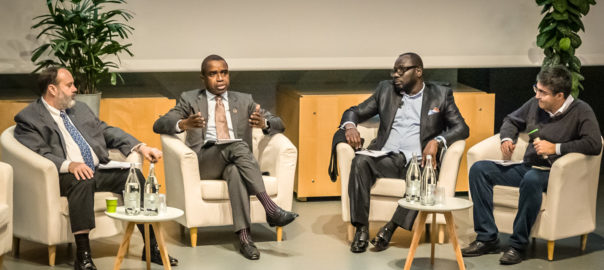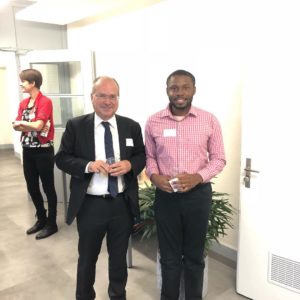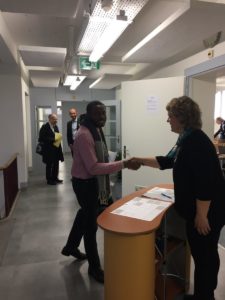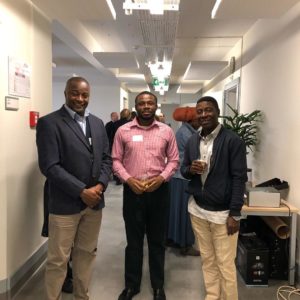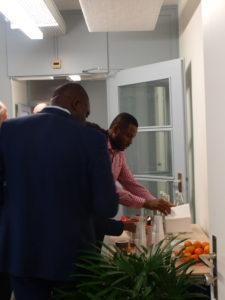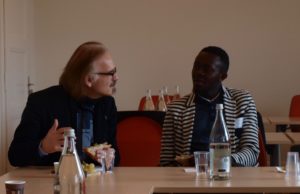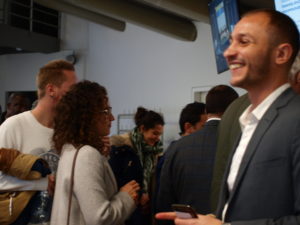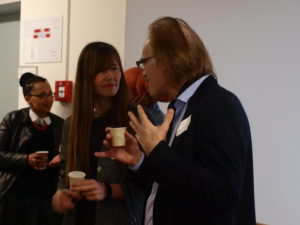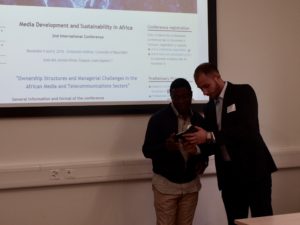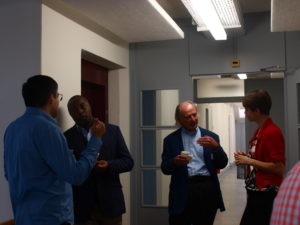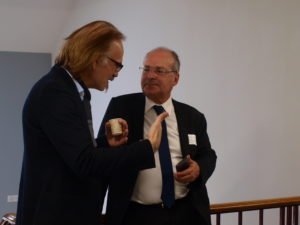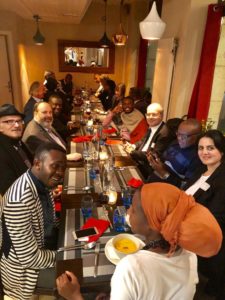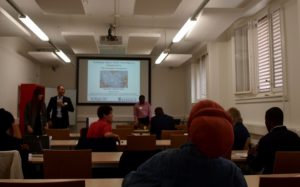Ownership Structures and Managerial Challenges in the African Media and Telecommunication Sectors
International Conference held on November 8-9, 2018 - University of Neuchâtel, Switzerland
Objective of the conference
Building on the first conference on media development in Africa held in 2015, this conference focused on the enabling technologies, namely telecommunications and Internet access. In particular, it aimed at investigating the impact of foreign ownership and managerial practices of companies in the telecommunications and media sector on (a) media and telecommunications policies, and (b) the democratic and economic development in African countries.
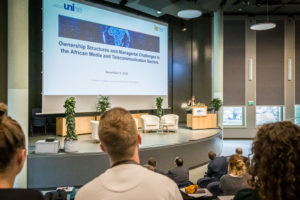 In this respect, following questions were addressed:
In this respect, following questions were addressed:
- What impact do varying ownership structures have on the provision of internet and mobile communication services? What role does foreign ownership play within this context?
- Does foreign ownership of telecommunication companies affect media and telecommunication policies? If yes, to what extent and how?
- What are the managerial practices that foreign companies adopt to successfully implement their investment strategies in the African telecommunication sector, and thus ensure the provision of internet and mobile communication services?
- What is the impact of these practices for media development in Africa?
- How do these practices contribute to the development of African human capital, for instance in terms of digital competences?
Further, we aimed at shedding light on how foreign investment can help to achieve the related UN sustainable development goals (SDGs), thus contribute to the democratic and economic development of the African continent.
In order to advance research in the field and to stimulate a constructive dialogue between practitioners and academics, the conference dedicated:
- one day to an academic workshop, and
- one day to professional contributions.
Please find below a summary of the two conference days. For more detailed information about the event, please see the official conference website.
Organizing committee, partners and funding institutions
- Organizers – Cinzia Dal Zotto, with Hatem Gabsi, Aicha Hammami, Mansour Omeira and Sara Wenger Roethlisberger – Enterprise Institute, University of Neuchâtel
- Academic Partners – Tina Freyburg, Lisa Garbe and Veronique Wavre – University of St.Gallen
- Funding Institutions – Swiss Network for International Studies, Swiss National Science Foundation and University of Neuchâtel
Research results from the International Academic Workshop on November 8, 2018
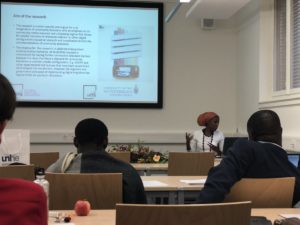 The first day of the conference featured an international workshop in which twelve academic papers were presented and discussed.
The first day of the conference featured an international workshop in which twelve academic papers were presented and discussed.
It gathered twenty-three researchers based in China, Ghana, Kenya, Nigeria, United Kingdom, Senegal, South Africa, Switzerland, and the United States of America.
Sessions were organized on the following subjects:
- Foreign direct investment (FDI) and its impact on media content and practices;
- African media in the digital age;
- Media ownership structures, policies and democratization.
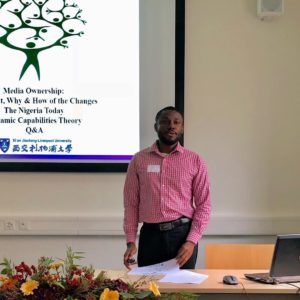
The papers featured case studies from Cameroon, Ghana, Kenya, Nigeria, and South Africa. Some papers provided regional overviews, with one paper focusing on Chinese investment in African media.
Authors of selected contributions will have the opportunity to submit their full manuscript for publication as part of a special issue of a journal or in an edited conference volume.
Contributions to the International Professional Conference on November 9, 2018
Prof. Cinzia Dal Zotto, University of Neuchâtel, Switzerland, welcomed participants to the conference and introduced Vice Rector Jean-Marie Grether.
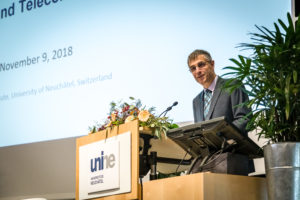 Prof. Jean-Marie Grether, Vice-Rector of the University of Neuchâtel, highlighted how the two-day conference fits within the long-term objectives of the university, which gives high priority and relevance to teaching and training, notably in contributing to the Sustainable Development Goals. He also underlined how the purpose and objectives of the conference are aligned with the values of the university, particularly quality, trust, dialogue and reciprocity, as well as openness.
Prof. Jean-Marie Grether, Vice-Rector of the University of Neuchâtel, highlighted how the two-day conference fits within the long-term objectives of the university, which gives high priority and relevance to teaching and training, notably in contributing to the Sustainable Development Goals. He also underlined how the purpose and objectives of the conference are aligned with the values of the university, particularly quality, trust, dialogue and reciprocity, as well as openness.
Prof. Cinzia Dal Zotto introduced keynote speaker Prof. Robert Picard, a leading expert in media economics and management and in communication policies, who has served as consultant for multiple governments on these matters and has written extensively about them.
Keynote
Telecommunication and media ownership in developing countries: State of the art
Robert G. Picard – Reuters institute, University of Oxford
Prof. Robert Picard, Reuters Institute for the Study of Journalism, University of Oxford, United Kingdom, noted that ownership and control are fundamental to firm behavior in the telecommunications and media sector. They affect capital availability, the locus of decisions, the geographic location of infrastructure, capabilities and range of services, internal and transnational profit flows, reinvestment and technological renewal, and the ability of governments to pursue domestic policy objectives.
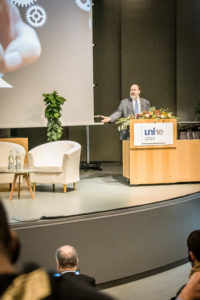 Telecommunications in developing countries have witnessed widespread privatization, poor competition, and persistent inequities in infrastructure and access. Policy remedy options include better regulation and incentives as well as increasing competition. As to media ownership, Prof. Picard noted that it requires far less resources than telecommunications.
Telecommunications in developing countries have witnessed widespread privatization, poor competition, and persistent inequities in infrastructure and access. Policy remedy options include better regulation and incentives as well as increasing competition. As to media ownership, Prof. Picard noted that it requires far less resources than telecommunications.
However, water and electricity access are preconditions for further development and most of the population in developing countries still does not have electricity at home. Telecommunications companies are not likely to invest in electricity infrastructure unless they have government guarantees regarding payment for use. Some ministries seem more willing to introduce the most advanced technology to urban areas, at a time when rural areas lack more basic infrastructure. Prioritization and equity issues are at play.
Discussion Panel 1 Ownership structures, regulation and policies in the telecommunications and media sectors in Africa
Introductory note
Prof. Tina Freyburg and Dr. Véronique Wavre, University of St. Gallen, Switzerland 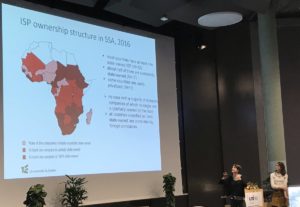 presented the research findings of the larger SNIS-supported project that the conference is part of. They presented a conceptual framework for thinking about the implications of state control over internet service providers and introduced the Telecommunications Ownership and State Control (TOSCO) data set they have developed covering 49 independent mainland countries in Africa over the period 2000–2016. They discussed how political and economic interests are intertwined with Internet infrastructure and ownership of telecommunications companies, highlighting the case of Internet shutdowns for electoral manipulation.
presented the research findings of the larger SNIS-supported project that the conference is part of. They presented a conceptual framework for thinking about the implications of state control over internet service providers and introduced the Telecommunications Ownership and State Control (TOSCO) data set they have developed covering 49 independent mainland countries in Africa over the period 2000–2016. They discussed how political and economic interests are intertwined with Internet infrastructure and ownership of telecommunications companies, highlighting the case of Internet shutdowns for electoral manipulation.
Panelists:
- Prof. Tina Freyburg, University of St. Gallen, Switzerland;
- Mr. Giacomo Mazzone, European Broadcasting Union, Internet Governance Forum & EuroDIG;
- Mr. Grégoire Ndjaka, Director-General, African Union of Broadcasting;
- Dr. Véronique Wavre, University of St. Gallen, Switzerland.
Key themes:
- Africa should not be thought of as a monolithic block: situations vary across the continent.
- Internet shutdowns have occurred both inside and outside election periods, as in the 2017 case of Cameroon’s English-speaking regions.
- The Constitution of the International Telecommunication Union stipulates that “Member States . . . reserve the right to cut off, in accordance with their national law, any other private telecommunications which may appear dangerous to the security of the State or contrary to its laws, to public order or to decency” (Article 34);
 moreover, each Member State “reserves the right to suspend the international telecommunication service” (Article 35). Governments’ expansive interpretation of these provisions has been used to justify Internet shutdowns, although their justification has been contested. No Member State, however, has asked to change this article.
moreover, each Member State “reserves the right to suspend the international telecommunication service” (Article 35). Governments’ expansive interpretation of these provisions has been used to justify Internet shutdowns, although their justification has been contested. No Member State, however, has asked to change this article. - Cooperation of the African Union of Broadcasting with the Arab States Broadcasting Union will help develop the Multimedia Exchange Network over Satellite (MENOS) in Africa, which uses IP as the core protocol.
- The use of technological innovations, notably with respect to solar energy, have facilitated Internet access.
- Internet penetration has increased in Africa thanks to mobile technology. Yet radio and television penetration remain higher than Internet penetration.
- Policy considerations span multiple often intertwined subjects, ranging from sports rights to national security and democracy, as witnessed in the undermining of beIN Sports’s 2018 FIFA World Cup broadcasting rights, including through bans and the appearance of beOutQ’s pirated feed.
- The Internet is global, whereas legislation is mainly national. The governance of the sector includes local, national, regional, and international levels that may sometimes conflict, and their application depends on power differentials. In addition to the WTO, UNESCO also has relevant international treaties such as the Convention on the Protection and Promotion of the Diversity of Cultural Expressions.
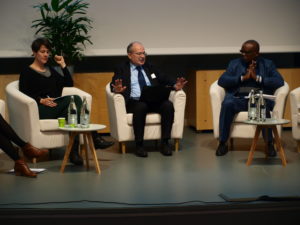
- Security agencies often require access to intercept voice and data even when services such as WhatsApp provide end-to-end encryption.
- The localization of international commitments varies widely. Licensing agreements are important, but States often exert power beyond the limits set in written commitments.
- The development of a Chinese-led Internet as an alternative to the US-led one has helped Chinese companies grow into some of the largest in the world.
- The question of privacy is complex, as illustrated in the cases brought by Max Schrems against Facebook for privacy violation.
Key recommendations:
- Revise the provisions of the Constitution of the International Telecommunication Union that have been used to violate human rights law.
- Choose media in the current context according to the target audience: radio for older segments, television for most of the population, and the Internet for the younger, more affluent, and more urban segments.
- Study the differential effects of policies, institutions, and practices on various segments of the population to ensure that they promote human rights.
Discussion Panel 2 Foreign direct investment motives and strategies in the telecommunications and media sectors in Africa
Video interview with Patrice Schneider, Media Development Investment Fund, Switzerland
Due to another engagement Mr. Patrice Schneider could not be present at the conference and was thus interviewed by Cinzia Dal Zotto, University of Neuchâtel, a few days before.
Mr. Schneider noted that with digital transformation, new actors are emerging to provide 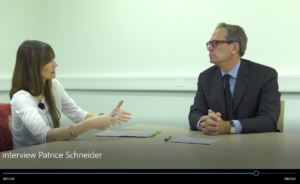 news information, beyond traditional journalism. Platforms for citizen engagement can have a social mission while being financially viable. Political transition, consumption, and digital acceleration that inform social investment decisions in the sector.
news information, beyond traditional journalism. Platforms for citizen engagement can have a social mission while being financially viable. Political transition, consumption, and digital acceleration that inform social investment decisions in the sector.
Please see the full video interview here.
Panelists:
- Mr. Emmanuel Biney, CEO of Media 7 Group and Chancellor of Doxa Open University, Ghana;
- Mr. Akinwale Goodluck, GSMA, Head of Sub-Saharan Africa, UK;
- Prof. Robert Picard, Reuters Institute for the Study of Journalism, University of Oxford, United Kingdom.
Key themes:
- Half the population in Sub-Saharan Africa is expected to have mobile phone
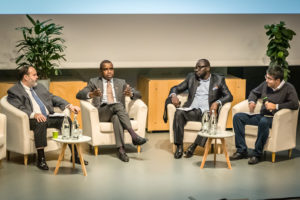 subscriptions by 2020. More investments will be necessary to ensure that the other half is covered and connected.
subscriptions by 2020. More investments will be necessary to ensure that the other half is covered and connected. - The investments that drove the telecommunications revolution in SSA started around 1999 and peaked around 2008–2010.
- Such investments involved high initial costs, including for securing licenses and purchasing equipment and rolling out the network.
- In 2001 the five bidders on the cellular licenses on auction in Nigeria were all African operators willing to invest despite the challenges that other investors found prohibitive, such as lack of electric power, low purchasing power, lack of human capacity, and lack of infrastructure. The high-risk investments led to high returns.
- In terms of human resources, the cost of employing an expatriate who had worked in Africa could be up to 20 times as much as that of employing a local. Companies increasingly relied on repatriates, Africans working in the mobile industry outside Africa, by giving them expatriate contracts that would be converted to local contracts after a few years.
- A major challenge for the investors was their inability to manage success.
- Foreign investors may request enhancement and expansion of infrastructure, but from a policy perspective it is necessary to first ensure that the existing technology is deployed to end users, as the Ghana experience suggests.
- When more licenses are sold than the infrastructure can allow, development of the infrastructure can attract foreign investors.
- Policy coherence and coordination are key for digital transition. For example, delays in developing electric power infrastructure can delay the ability to use the developed transmission equipment and infrastructure.
- Investor motives vary and can evolve. They may include commercial motives, such as in terms of profit or shareholder value. Other business benefits include prestige, access to specific parts of society, and expanding influence.
- Companies witnessing slowing growth in the markets they operate it explore opportunities for expansion in other markets. Diversifying the portfolio geographically contributes to risk management.
- Foreign investors may include those seeking high-risk/high-return investments, a prominent example of which is long-term investment in infrastructure.
- Socially responsible investment funds may invest in media, telecommunications, and other infrastructure seeking return on investment as well as contribution to society.
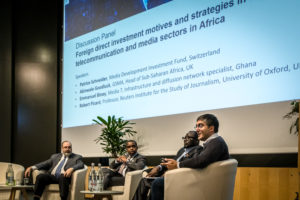
- From a policy or social criticism perspective it is easier to understand and deal with firms that are driven by purely commercial motives, whereas it is more challenging with investors that do not have transparent motives, such as those investing for influence.
- Some commercial motives can also lack transparency, as in introducing company-specific encryption on a platform with the unstated goal of selling premium content in the future.
- Policymakers often negotiate on technical issues without consulting experts in the domain.
- Corruption remains an important problem along with lack of transparency.
- Telecommunication companies are increasingly collaborating with media and content providers to develop their competencies in the area, as illustrated in video-on-demand and TV-on-demand.
- For example, the mobile industry has collaborated with the creative industries such as music and movie industries to develop local content.
- New revenue sharing models are emerging between mobile operators, content providers and media companies.
- Some actors donate funds to media and content providers, and some investors provide more favorable terms to support them. Identifying such donors and investors, however, is a challenge.
- Beyond the questions of infrastructure, affordability, and digital literacy, a major obstacle for increasing Internet adoption in Sub-Saharan Africa is the lack of relevant local content in local languages.
- Mobile phone standards contributed to the mobile revolution. Most operators are struggling to monetize their investments in data, with voice still dominant in Sub-Saharan Africa.
- The infrastructure developed by mobile network operators is difficult to replicate for planning, environmental, technical and administrative reasons, which means that infrastructure will remain valuable.
- Mobile virtual network operators are strong partners for the mobile network operators they buy capacity from.
- Sub-Saharan Africa has more prepaid than postpaid subscribers, for reasons ranging from addresses to the financial system, which means that subscribers seldom have contracts for subsidized handsets.

- Obstacles for investors to connect the unconnected in Africa include low purchasing power, young age, and high cost of developing infrastructure for rural areas.
- The national origins of companies and that of their chief executive officers need not coincide. For example, the subsidiaries of many multinationals are led by Africans, whereas some local companies are led by non-Africans.
- High-risk contexts for Americans and Europeans such as Afghanistan seek to attract expertise from other regions such as Sub-Saharan Africa.
- There is often a disconnect, especially in rural areas, between the motives of investors and those of workers on the ground, who then do not receive enough support and incentives, which lowers their motivation to sustain and improve the services.
Key recommendations:
- Use financial analysis to inform policy processes and sequencing, to attract and retain investment while ensuring that policy objectives are met.
- Develop new models of collaboration between technology, media, and telecommunication companies to develop and deliver relevant local content in local languages.
- Move toward universal access, by prioritizing rural areas and exploring possibilities ranging from subsidy models to technological innovations to make increased coverage economically viable.
- Develop the capacity of local staff to ensure the sustainability of infrastructure, by including them in the process from the start, training them, and instilling a culture of lifelong learning, rather than relying on intermittent external expertise.
Keynote:
Jobs, FDI and institutions in Sub-Saharan Africa: Evidence from firm-level data
Dr. Sotiris Blanas – National Bank of Belgium (formerly University of Lancaster)
Dr. Sotiris Blanas presented the results of a research undertaken in collaboration with Adnan Seric, United Nations Industrial Development Organization, and Christian Viegelahn, International Labor Office. He noted that important policy questions regarding foreign-owned enterprises include their relative contribution to employment, both in terms of quantity and quality of jobs, as compared with domestic enterprises. Notable aspects of job quality include job stability and security, opportunities for training and development, and wage levels. He provided key results based on the analysis of firm-level 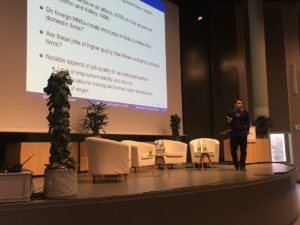 data from the UNIDO Africa Investor Survey 2010. Foreign-owned firms offer more stable and secure jobs than domestic firms: the have a higher share of permanent full-time workers and a lower share of temporary workers. Moreover, foreigner-owned firms rely less on unpaid work: they are less likely to offer unpaid work, and when they do, they have a lower share of unpaid workers.
data from the UNIDO Africa Investor Survey 2010. Foreign-owned firms offer more stable and secure jobs than domestic firms: the have a higher share of permanent full-time workers and a lower share of temporary workers. Moreover, foreigner-owned firms rely less on unpaid work: they are less likely to offer unpaid work, and when they do, they have a lower share of unpaid workers.
The higher job stability and job security are offered by foreign-owned firms created as green-field investments, those whose main business purpose is to service the home and foreign markets, and those whose most critical incentive is in the form of capital grants, tax exemption, and improved infrastructure. Country-level institutional factors matter. In countries with higher firing costs and higher governance quality, the gap between foreign-owned and domestic firms is smaller in terms of job security and stability. Foreign-owned firms have higher shares of total foreign employment and higher shares of foreign production, non-production, and managerial workers. Foreign-owned firms tend to invest 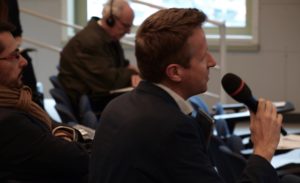 more in training and have a higher average training intensity. Training intensity is higher for firms whose parent company is in a high-income country, for those created as a green-field investment, for those whose main business purpose is to access inputs and achieve cost-effective production, and for those whose critical investment incentive is tax exemption and recruitment grants. Moreover, foreign-owned firms tend to pay higher wages. The wage gap between foreign-owned and domestic firms is lower in countries with higher governance quality and greater social inclusion.
more in training and have a higher average training intensity. Training intensity is higher for firms whose parent company is in a high-income country, for those created as a green-field investment, for those whose main business purpose is to access inputs and achieve cost-effective production, and for those whose critical investment incentive is tax exemption and recruitment grants. Moreover, foreign-owned firms tend to pay higher wages. The wage gap between foreign-owned and domestic firms is lower in countries with higher governance quality and greater social inclusion.
In summary, relative to domestic firms, foreign-owned firms in Sub-Saharan Africa tend to create more stable and secure, higher-paying jobs, with more training opportunities. Yet such better job outcomes vary with firm characteristics, such as parent location, and critical incentive for foreign investment. Looking forward, it will be important to further study the extent to which multinational enterprises transplant their human resource practices into their African affiliates, and the extent to which such practices spill over to domestic firms. It will also be important to better understand the role of various employment policy institutions and measures in determining outcomes, and how such outcomes vary across firms (for instance in terms of national origin and economic sector of the enterprise) and workers (notably in terms of gender and national origin).
Discussion Panel 3: FDI practices and corporate social responsibility in the telecommunications and media sectors in Africa
Panelists:
- Mr. Sotiris Blanas, National Bank of Belgium;
- Mr. Nicolas Boissez, Delegate for Communication and Partnerships, Former Program Officer for the DRC, Côte d’Ivoire and Mali, Fondation Hirondelle, Switzerland;
- Mr. Serge Michel, former Director of Le Monde Afrique, Founder Heidi.news, Switzerland;
- Prof. Eli Noam, Columbia University, United States of America (via videoconference).
Key themes:
- Three important challenges or digital divides that African countries are with respect to infrastructure, Internet (including mobile) connectivity, and e-commerce.
- According to an October 2018 report by Ernst & Young, foreign direct investment into Africa’s Technology Media and Telecommunications (TMT) industries declined by 43% in 2017, with Kenya witnessing fast growth, particularly in its Silicon Savannah initiative.
- Studies suggest that only a quarter of FDI determinants are country-specific, and that the rate of return, even adjusting for risk, is higher in high-risk countries, findings that challenge the argument that these countries need to change their governance structures to attract investment.
- There is a tension between the use and production of technology. Access to
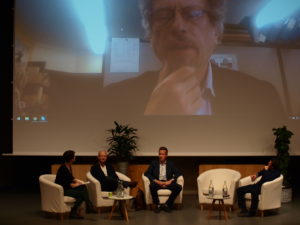 technology in terms of use has a vast array of benefits, notably in terms of communication, literacy, health, and tourism, but it is important to also establish the foundations for African technology production to overcome the technological dependence of African countries.
technology in terms of use has a vast array of benefits, notably in terms of communication, literacy, health, and tourism, but it is important to also establish the foundations for African technology production to overcome the technological dependence of African countries. - A similar tension exists between the use and production of news and media content. For example, local channels find it easier to adapt content developed by mainstream media rather than developing their own, with the challenges they confront potentially including security issues, for instance in slum areas.
- Without a solid base of domestic and regional applications and e-commerce providers, better infrastructure and internet connectivity will likely increase imports from more digitally advanced countries and slow down exports and thus undermine economic development.
- In terms of digital financial services, Africa has many success stories, as in the case of M-PESA, launched by Safaricom in Kenya in 2007. E-finance can lead to encrypted currencies, which can undermine the role of central banks to manage monetary policy. Moreover, in more unstable countries, people may find easier to flee their national currency, which can foment macroeconomic risk.
- Online media are becoming increasingly complex, participatory, and experiential, which are challenging to produce, meaning that poorer countries may find it easier to import cheaper content from more technologically advanced countries.
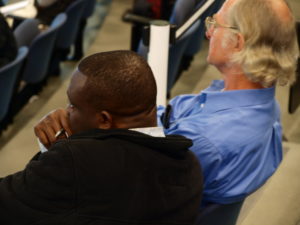
- E-health provides a great potential to improve health outcomes, but such services are likely to feature inequities in terms of access, with the risk of importing electronic medical services from other countries, thus undermining the development of domestic medical services.
- Digitization disrupts old models of doing business, as illustrated in the challenged faced by traditional journalism, but it also opens opportunities for those who anticipate change and adapt to it, as in the example of e-conferences of professional physicians overcoming the constraints of organizing traditional conferences.
- The African continent includes a wide variety of cultural value systems, in which development can take diverse trajectories, with no predetermined pathway regarding the effect of the Internet. Cultures and technologies co-evolve in
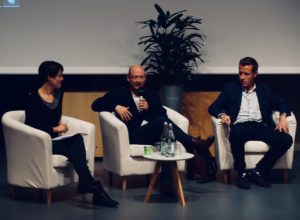 indeterministic ways.
indeterministic ways. - Support organizations can adopt a stepwise approach, as illustrated by the case of Fondation Hirondelle in Mali, for instance by supporting the development of capacities concerning radio, and gradually expanding to video and social media.
- Africa features technological innovations that may not exist in more technologically advanced regions. For example, among the new technologies facilitating access to medical services is the case of using fingerprint biometrics to identify patients and retrieve their medical information in remote areas.
- The benefits of technological innovations should not conceal the potential associated risks, notably in terms of the privacy, security, and confidentiality of information. Such problems, however, should not be assumed to be Africa-specific: they are global, as illustrated in the Cambridge Analytica scandal, and as such should not be used to curtail African technological development, although they should be taken seriously.
- Examples of successful local adoption and adaptation of technology exist in the entertainment industries as well, as in the example of Nollywood starting in Nigeria and expanding beyond it for the film industry, which from being initially derided for
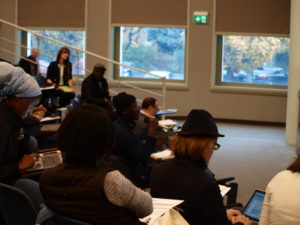 its low quality, has becoming a booming center that is increasingly digitized.
its low quality, has becoming a booming center that is increasingly digitized. - There is an increasing presence of African nationals in the leadership of telecommunications, media, and technology multinational enterprises. In terms of education and training, domestic African initiatives have emerged allying both professional and academic training in collaboration with technological companies, as in the case of Doxa Open University in Ghana.
- Attempts to develop media are more likely to fail when the development of local capacities and constant dialogue with local stakeholders are ignored.
- Despite the benefits of foreign direct investment, there is a fear that it may be a form of neocolonialism, and as such it is important for African actors to forge their own developmental pathways in a way that is consistent with democracy, justice, and human rights.
Key recommendations:
- Address early on the potential risks associated with the digital divides, particularly with respect to digital medical services, to ensure that countries do not undermine in the long run their domestic medical services as they advance in the digital transition.
- Support capacity and infrastructure development for local journalists to produce fact-based, non-partisan, relevant, and accurate news and information, to support public access to information as part of sustainable development goals.
- Recognize, trust, and support local African capacities to anticipate, adapt to, and contribute to technological change, and guard against paternalistic approaches in which external actors consider themselves as knowing better than local populations what their priorities should be. A stance of cautious optimism seems more promising than either optimism or pessimism.

- Use a diverse toolkit of media and technologies to reach different segments of the population in a more targeted manner, including through traditional and social media, depending on access and usage profiles for different groups.
- Adopt a holistic view of development that is not restricted to technology, by also addressing its social, cultural, political, economic and ecological dimensions.
- Pay attention to questions of privacy, security, and confidentiality of information, without using them as impediments for technological and broader development, while considering the potential (mis)uses they may offer, including in the political arena.
- Ensure respect for human rights, and avoid facilitating their infringement, with foreign actors applying a level of standards at least consistent with those in their home countries.
- Engage in dialogue on the ethics of foreign direct investment to ensure that business is conducted ethically and efficiently.
Closing remarks
In her closing remarks, Prof. Cinzia Dal Zotto emphasized the importance of adopting a pragmatic and realistic perspective within a broader problem-solving approach that respects ethical values. She noted that power and wealth differentials are prevalent globally, but taking different forms in different contexts, and as such local approaches should be context-specific while addressing global dimensions. She warmly thanked participants for their contributions, particularly those coming from Africa to share their voices and experiences.
And here a few more pictures taken during this interesting and enjoyable event 🙂
